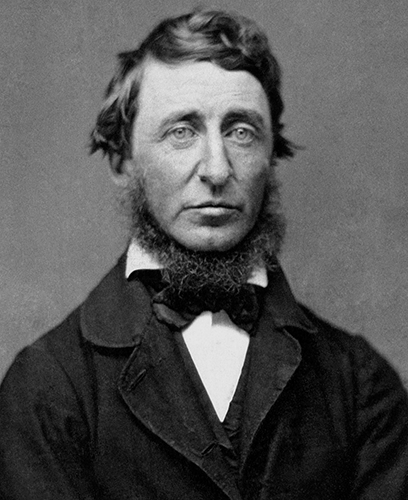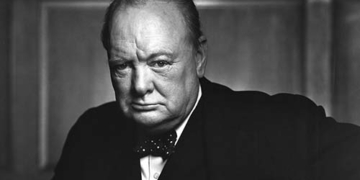Share via:

Henry David Thoreau (1817 – 1862) was an American naturalist, essayist, poet, and philosopher. A leading transcendentalist, he is best known for his book Walden, a reflection upon simple living in natural surroundings, and his essay “Civil Disobedience” (originally published as “Resistance to Civil Government”), an argument for disobedience to an unjust state.
Thoreau’s books, articles, essays, journals, and poetry amount to more than 20 volumes. Among his lasting contributions are his writings on natural history and philosophy, in which he anticipated the methods and findings of ecology and environmental history, two sources of modern-day environmentalism. His literary style interweaves close observation of nature, personal experience, pointed rhetoric, symbolic meanings, and historical lore, while displaying a poetic sensibility, philosophical austerity, and attention to practical detail. He was also deeply interested in the idea of survival in the face of hostile elements, historical change, and natural decay; at the same time he advocated abandoning waste and illusion in order to discover life’s true essential needs.
Thoreau was a lifelong abolitionist, delivering lectures that attacked the Fugitive Slave Law while praising the writings of Wendell Phillips and defending the abolitionist John Brown. Thoreau’s philosophy of civil disobedience later influenced the political thoughts and actions of such notable figures as Leo Tolstoy, Mahatma Gandhi, and Martin Luther King Jr.
Thoreau’s political writings had little impact during his lifetime, as “his contemporaries did not see him as a theorist or as a radical”, viewing him instead as a naturalist. They either dismissed or ignored his political essays, including Civil Disobedience. The only two complete books (as opposed to essays) published in his lifetime, Walden and A Week on the Concord and Merrimack Rivers (1849), both dealt with nature, in which he “loved to wander”. Nevertheless, Thoreau’s writings went on to influence many public figures. Political leaders and reformers like Mohandas Gandhi, U.S. President John F. Kennedy, American civil rights activist Martin Luther King Jr.
Henry David Thoreau also influenced many artists and authors including Edward Abbey, Willa Cather, Marcel Proust, William Butler Yeats, Sinclair Lewis, Ernest Hemingway, Upton Sinclair, E. B. White, Lewis Mumford, Frank Lloyd Wright, Alexander Posey, and Gustav Stickley.
Henry David Thoreau – First Editions Identification Guide
This is a selective bibliography of Thoreau’s most important works. For further details of his other works, please refer to the reference section.
| Year | Title | Publisher | First edition/printing identification points |
|---|---|---|---|
| 1849 | A Week on the Concord and Merrimack Rivers | Boston: James Munroe and Company | Four bindings, no priority:
Note: pp. 351-356: catalogue of Scott’s publications. |
| 1854 | Walden; or Life in the Wood | Boston: Ticknor and Fields, , M DEntered according to Act of Congress, in the year LIV | Brown T cloth (ribbed). Front and back covers blind-stamped with triple-rule border, small floral design extending in from each corner, and large scroll work design in center. Spine blind-stamped with rules and gold-stamped ($1.00). "Entered according to Act of Congress, in the year 1854" stated on © page. 2000 copies printed. ALSO: Boston: Ticknor and Fields, MD. Entered according to Act of Congress, in the year LXII. Second printing. Notes: Numerous reprints of the Ticknor & Fields plates until 1890. There were apparently twenty-seven printings made from the original plates. ALSO: London: Walter Scott, 1886. First English edition. Very red or dark blue BF cloth (linen-like). Front cover upper left corner stamped in black. |
| 1863 | Excursions | Boston: Ticknor and Fields, 1863 | Three bindings, green cloth; various types,no priority: (A) BD cloth (pebbled).(B) TR cloth (sawtooth). (C) Z cloth (triangles). "Entered according to Act of Congress, in the year 1863" stated on © page. 1500 copies printed. ALSO: Boston: Ticknor and Fields, 1964. Second printing. Note: Excursions continued to be reprinted from the Ticknor & Fields plates until the Riverside Edition was published in 1894. |
| 1864 | Maine Woods | Boston: Ticknor and Fields, 1864 | Nine bindings, no priority:
Notes: The Maine Woods continued to be reprinted from the T&F plates until the Riverside Edition was published in 1894. |
| 1865 | Cape Cod | Boston: Ticknor and Fields, 1865 | Front and back covers blind-stamped with thick-rule border enclosing lighter-rule border within a second double-rule border with small design in corner blocks, wreath in center. Spine blind-stamped with heavy and light rules at top and bottom and gold-stamped. 24-page catalogue dated December 1864 inserted at back. Seven bindings, no priority:
ALSO: London: Sampson Low & Co, 1865. First English edition. Dark green P cloth (pebbled). Front and back covers blind-stamped with triple-rule border and large scroll-work design in center. Spine gold-stamped. |
| 1865 | Letters to Various Persons | Boston: Ticknor and Fields, 1865 | Eight bindings, priority as listed:
|
| 1866 | A Yankee in Canada | Boston: Ticknor and Fields, 1866 | Front and back covers blind-stamped with thick-rule border enclosing lighter-rule border within a second double-rule border with small design in boxed corners, and wreath in center. Spine gold-stamped, pp. 287-288: blank. Six bindings, no priority:
|
| 1881 | Early Spring in Massachusetts | Houghton, Mifflin and Company 1881 | Deep green S cloth (silk). Front cover goldstamped with signature “Henry D. Thoreau”. "Copyright, 1881" stated on © page. |
| 1884 | Summer | Houghton, Mifflin and Company,1884 | Deep green S cloth (silk). Front cover gold-stamped with signature “Henry D. Thoreau”; back cover blank. Both cover edges beveled. Spine gold-stamped. "Copyright, 1884" stated on © page. 1250 copies printed. ALSO: London: T. Fisher Unwin, 1884. First English edition. Deep green S cloth (silk). Front and back cover edges beveled. Front cover gold-stamped. T. Fisher Unwin catalogue dated 1884 inserted at back. |
| 1888 | Winter | Houghton, Mifflin and Company, 1888 | Deep green S cloth (silk). Front cover goldstamped with signature “Henry D. Thoreau”; back cover blank."Copyright, 1887" stated on © page. |
| 1892 | Autumn | Houghton, Mifflin and Company, 1892 | Deep green S cloth (silk). Front cover blind-stamped with the signature “Henry D. Thoreau”; back cover blank. "Copyright, 1892" stated on © page. 500 copies printed. |
| 1894 | Miscellanis | Houghton, Mifflin and Company, M DEntered according to Act of Congress, in the year XCIV | Deep green BF cloth (fine bead). Covers blind-stamped with rule border. Spine goldstamped. "Copyright 1893, by Hougnton, Mifflin & Co." stated on © page. 500 copies printed. |
| 1895 | Poems of Nature | London: John Lane, The Bodley Head, MDEntered according to Act of Congress, in the yearXCV | Gray yellow-brown V cloth (linen-like). Front and back covers blank. Front and back covers beveled. Spine gold-stamped. Limited to 750 copies, 250 copies to be published in America by Houghton, Mifflin. |
Reference:
- Wikipedia
- Raymond R. Borst: Henry David Thoreau, A Descriptive Bibliography

